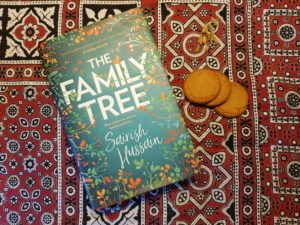I don’t usually do tear-jerkers. Life can be heartbreaking enough as it is, and whilst I don’t want my fiction sugar-coated as such, I do object to being strung up by my heartstrings for kicks. More often than not, I find, it’s just not worth the emotional payout.
And yet. Sairish Hussain’s epic debut The Family Tree had me crying on four or five separate occasions – I can’t actually remember the last novel that had me cry once – and I didn’t resent the emotional bleed one bit. What’s more, I felt sort of gratified by it.
Let me back track a bit. When I first heard of this book, at a debut author showcase at HQ publishing, it wasn’t sold as an emotional rollercoaster. Hussain gave an impassioned 60 second introduction of her novel, lamenting the stereotyped and stigmatised representation of Muslims in fiction – terrorism, forced marriage and every other trope – which ultimately informed her tale of a regular British Muslim family, facing the kind of hardships that could befall anyone, anywhere. Well, she sure succeeded. And then some.
There are no shortage of hardships that befall the Sharif family.
The Family Tree traverses 20 years, beginning in 1993, when Amjad loses his wife during childbirth, leaving him with the care of his young son Saahil and newborn daughter Zahra. Understandably, Neelam’s untimely death remains a defining marker in their lives. An emblem remains in the form of a Pakistani shawl – a gift from her own mother – worn by Neelam as she died. Interwoven in its fibres is a tree, decorated with a bird montage. A grieving Amjad comforts his baby with the fabric, anointing each bird with a name from their family. At the top, watching, her mother. Literally, a family tree.
Enough spoilers.
Hussain has crafted a tale that is alive with culture. Amjad and his family are of Pakistani extraction, speaking both Punjabi and Urdu, as well as English. I can relate. As much as I adore cultural markers in any story, as a way of bringing them to life, I’ve taken a particular pleasure in enjoying the Pakistani or desi offerings in the books I’ve been reading of late. Hussain does this particularly well, from the trials of roti training, chilling with chai and flying chicken botis. I revelled in it all.
Diversity matters, people. For children, but for adults too, a bit of positive representation goes a long way. Especially for the generations who grew up without it.
Truly, this is a great book. I am in awe that Hussain – particularly as a debut author – never once shies away from the big issues, all of which we are all guilty of sweeping under the carpet. The Family Tree grapples with bereavement, homelessness, addiction, identity, race and all manner of cultural and political issues with a directness and sensitivity that is quite masterful for one so young to the craft. And yet, at heart, it remains a personal and a familial novel. This, I think, is Hussain’s unique brand of magic in bringing about The Family Tree.
I don’t, after all, cry easily. Perhaps I have learned to harden my heart over the years. Yet Sairish Hussain carries her characters with such intelligent empathy that you cannot help but open your heart to them. Feel for them. Weep for them.
Thank you for leaving my heart a little softer and a little warmer. And my mind just that little bit more aware.
Reviewed by Nadia Tariq
The Family Tree by Sairish Hussain will be realesed on Feb 20th, by HQ

